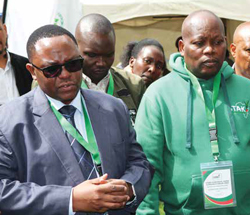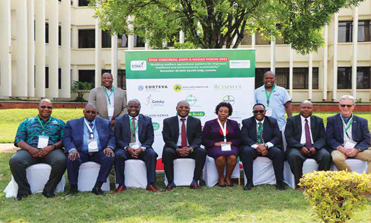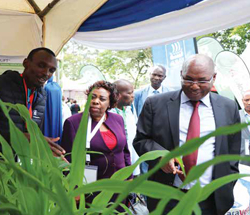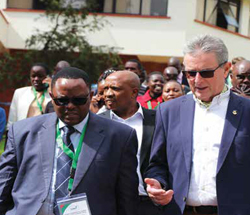STAK Annual Congress and Mazao Forum 2022
 Seed Trade Association of Kenya (STAK)-an umbrella body bringing together all the seed processors in the country, recently held a two-day conference at the Kenya Agricultural and Livestock Research Organization Headquarters (KALRO) in Loresho, Nairobi.
Seed Trade Association of Kenya (STAK)-an umbrella body bringing together all the seed processors in the country, recently held a two-day conference at the Kenya Agricultural and Livestock Research Organization Headquarters (KALRO) in Loresho, Nairobi.
Not long ago, discussions had been held on the need to advance agriculture innovations and technologies that spark growth in food production as well as environmental preservation. Therefore, as a way to further this agenda, STAK invited stakeholders involved in the seed industry including development partners, processors, government officials, machinery suppliers, research institutions, agrochemicals, agro-dealers, farmers, and members of the fourth estate to the 2022 STAK Annual Conference.
Under the theme, “Building resilient agricultural systems for improved livelihood and environmental sustainability,” a myriad of speakers took the podium to educate farmers and stakeholders on pertinent issues affecting the seed value chain and legal frameworks that regulate seeds distribution and usage. Farmers also took the opportunity to air their grievances as well as to ask questions. Among the presenters for the twoday event were; Advanta Seeds Africa, The International Maize and Wheat Improvement Center (CIMMYT) , Kenyatta University, Kenya Plant Health Inspectorate Service (KEPHIS), Agri Experience, Agrochemicals Association of Kenya(AAK), Crop Life, Crop Nutrition Laboratory
 Services (Cropnuts), Consultative Group on International Agricultural Research (CGIAR), National Seed Association of Rwanda (NSAR), Pest Control Products Board(PCPB), Society of Crop Agribusiness Advisors of Kenya (SOCAA) , ) KALRO among others. The two days saw free flow of information from different speakers such as Boddupalli.M. Prasanna- Director, Global Maize Program, CIMMYT & CGIAR Plant Health Initiative Lead; who talked on Deploying Climate resilient Maize in Africa elaborating on maize in the Tropics under a subtitle on ‘Food, Feed & Source of Sustenance and Income for Millions.’ Prasanna, said, according to research, 194 million hectares of land worldwide is in the tropics and approximately 70 Million hectares is in the rain fed tropical environments of Africa, Asia and Latin America. Maize in itself is accountable for 15-56% of calories in the sub-saharan Africa, Latin America and Asia. Prasanna said that South Asia and Sub- Saharan Africa are indeed ''hot-spots'' for climate-induced variabilities and extremes. “There is no magic bullet and thus we need an array of interventions, including improved stress-resilient and nutritionally enriched crop varieties plus sustainable intensification practices and enabling policies.” A combination of solutions, along with enabling policies, are required to sustainably increase crop yields and livelihoods of smallholders.
Services (Cropnuts), Consultative Group on International Agricultural Research (CGIAR), National Seed Association of Rwanda (NSAR), Pest Control Products Board(PCPB), Society of Crop Agribusiness Advisors of Kenya (SOCAA) , ) KALRO among others. The two days saw free flow of information from different speakers such as Boddupalli.M. Prasanna- Director, Global Maize Program, CIMMYT & CGIAR Plant Health Initiative Lead; who talked on Deploying Climate resilient Maize in Africa elaborating on maize in the Tropics under a subtitle on ‘Food, Feed & Source of Sustenance and Income for Millions.’ Prasanna, said, according to research, 194 million hectares of land worldwide is in the tropics and approximately 70 Million hectares is in the rain fed tropical environments of Africa, Asia and Latin America. Maize in itself is accountable for 15-56% of calories in the sub-saharan Africa, Latin America and Asia. Prasanna said that South Asia and Sub- Saharan Africa are indeed ''hot-spots'' for climate-induced variabilities and extremes. “There is no magic bullet and thus we need an array of interventions, including improved stress-resilient and nutritionally enriched crop varieties plus sustainable intensification practices and enabling policies.” A combination of solutions, along with enabling policies, are required to sustainably increase crop yields and livelihoods of smallholders.
To sum it all Prasanna suggested opportunities for;
- Breeding process improvement using novel tools/technologies for increasing genetic gains in stress-prone environments
- Reducing COGS, and enhancing affordability and accessibility of climateresilient varieties
- Stronger public-private partnerships for systematic and accelerated varietal turnover
- Stimulation of demand for new varieties with improved genetics using innovative approaches
 Advanta Seeds Africa on the other hand highlighted the challenges and opportunities in the vegetable seed business. The opportunities which include; consistent population growth, Health awareness on nutrition, expanded preferences on indigenous vegetables and Local Production of vegetables. However, challenges facing the vegetable seed business as discussed by Advanta were numerous ranging from;
Advanta Seeds Africa on the other hand highlighted the challenges and opportunities in the vegetable seed business. The opportunities which include; consistent population growth, Health awareness on nutrition, expanded preferences on indigenous vegetables and Local Production of vegetables. However, challenges facing the vegetable seed business as discussed by Advanta were numerous ranging from;
- Oversees breeding that doesn’t resonate with Africa needs
- VAT inclusion on vegetables-Increases Input cost for SHF
- Counterfeiting-Impacts on production
- Seed handling-Storage conditions at channel level that impacts on viability
- Pest and Diseases-shortening product life cycle
- Predictability-forecasting is difficult due to scanty market information.
- Lack of adequate research/trial/ segmentation information that leave farmers vulnerable
- Fluctuation and unassured market prices farm produce-No assurance of return business
- Dependency on imported seeds
- Too much too little-There is an upsurge of vegetable seed companies
- Inadequate local research on vegetables and data.
KEPHIS’ representative Simon Maina talked on ‘Authorization as a Catalyst to Seed Production in Kenya.’ Emphasis was put on Requirements for self-regulation, legal framework, authorization guidelines, eligibility, requirements for authorization as well as benefits of authorization.
Mulemia Maina, of Agri Experience outlined seed standards. “Standard Seed means seed that has met the minimum laboratory and post control standards for categories of crop as set by KEPHIS and is a progeny of certified 2nd generation or certified Standard Seed or by declaration by the Cabinet Secretary,” he said. Mulemia pointed out Challenges and lessons which included;
- Difficulty in registration of Standard Seed vegetatively propagated crops on KEPHIS certification MIS.
- Single inspection that requires seed growers to be very knowledgeable in seed certification processes and requirements e.g. timely crop registration, rouging etc.
- Drought challenge –need for irrigation options for seed crops
- Outgrowers’ limited seed-production knowledge (many practices geared to maize production) requiring intensive training Small scattered land sizes among seed outgrowers making inspection difficult and expensive
- Low seed productivity: Lack of extension services and financial constraints leading to low use of required agro inputs (fertilizers and chemicals)
- Unrealistic expectation that seed price will automatically be lower –this will depend on forces of supply and demand
He went on to state opportunities despite challenges saying that;
- Potentially lower costs in the long run if seed volumes increase considerably, especially if using authorized private inspectors
- Renewed interest among donors and financial institutions to invest in non-maize crops
- Can be sold locally and also exported
- Possibility of adding new crops which fit into selection criteria and are important for food or feed security.
- Outgrowers can become seed producing entities, increasing number of seed companies focusing on non-maize crops.
- KEPHIS is very supportive of standard seed because they recognize the challenge of seed availability of the focus crops.
 Prof. Richard O. Oduor Ag. Registrar Research Innovation &Outreach Kenyatta University & Chairman KUBICO discussed ‘Biotechnology as an option for increased seed production: What’s next after lifting the GMO ban?’ He said crops targeted for Genetic Engineering included, Maize, Sweet potato, Cassava, Groundnuts, Sorghum, Rice, Tomato and Pegion peas.
Prof. Richard O. Oduor Ag. Registrar Research Innovation &Outreach Kenyatta University & Chairman KUBICO discussed ‘Biotechnology as an option for increased seed production: What’s next after lifting the GMO ban?’ He said crops targeted for Genetic Engineering included, Maize, Sweet potato, Cassava, Groundnuts, Sorghum, Rice, Tomato and Pegion peas.
AAK’s Eric Kimunguyi addressed seed treatment: ‘securing livelihoods and sustainable production’ pointing out the Benefits for seed treatment as;
- Reducing the rate of pesticide use since it is applied to a smaller surface area (on the seed alone).
- Timely intervention of key pests and diseases before critical damage stage
- Ability to be integrated to IPM effectively
- Time and energy saving for pest management.
- Preserving seed quality and genetic potential
Kimunguyi mentioned several seed treatment methods such as Seed dressing, Seed coating, Pills, encrusting and Seed pelleting.
Crop nuts adressedB ‘Building Resilient Food Systems for smallholder farmers in Africa’ putting emphasis on building a Food Secure Africa, Balancing soil and fertilizer management for increasing yields.